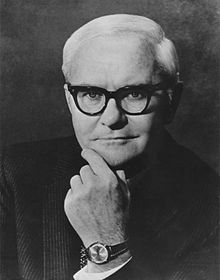Kenneth Rush
David Kenneth Rush | |
|---|---|
 | |
| United States Ambassador to France | |
| In office November 21, 1974 – March 14, 1977 | |
| President | Gerald Ford Jimmy Carter |
| Preceded by | John N. Irwin, II |
| Succeeded by | Arthur A. Hartman |
| United States Deputy Secretary of State | |
| In office February 2, 1974 – May 29, 1974 | |
| President | Richard Nixon Gerald Ford |
| Preceded by | John N. Irwin, II |
| Succeeded by | Robert S. Ingersoll |
| United States Deputy Secretary of Defense | |
| In office February 23, 1972 – January 29, 1973 | |
| President | Richard Nixon |
| Preceded by | David Packard |
| Succeeded by | Bill Clements |
| United States Ambassador to West Germany | |
| In office July 22, 1969 – February 20, 1972 | |
| President | Richard Nixon |
| Preceded by | Henry Cabot Lodge, Jr. |
| Succeeded by | Martin J. Hillenbrand |
| Personal details | |
| Born | January 17, 1910 Walla Walla, Washington, USA |
| Died | December 11, 1994 (aged 84) Delray Beach, Florida, USA |
| Political party | Republican |
| Spouse | Jane Gilbert Smith |
| Children | Malcolm, John Randall, Kenneth, George, David, Cynthia Monahan |
| Profession | Diplomat, Business, Professor |
David Kenneth Rush (January 17, 1910 – December 11, 1994) was a United States Ambassador who helped negotiate the ground-breaking four-power agreement in 1971 that ended the post-war crisis over Berlin.[1]
Early life
Kenneth Rush was born David Kenneth Rush in Walla Walla, Washington, where his parents, from an old Tennessee family, had journeyed during a yearlong tour of the western United States. His father was a farmer in Greenville, Tennessee and his mother a teacher. His father died when he was two years old.[1] After attending secondary schools in Greenville, Rush worked his way through the University of Tennessee by waiting on tables. He majored in history and was elected into the Phi Beta Kappa. In 1932, he enrolled in Yale Law School, where he edited the law journal and earned an LL.B. degree.[2]
Career
Early career
From 1936-1937, Rush joined the Duke University faculty as an assistant professor and taught law. It was here that he met to-be-President Richard Nixon who was a student at the university. It was the beginning of their enduring friendship. In 1937, Rush accepted an offer to join the Union Carbide and Carbon Corporation with the prospect of an executive position. He became a vice president in 1939 and was named president in 1966.[1]
Political career
Rush resigned from all private positions in 1969 to become United States Ambassador to West Germany. President Richard Nixon appointed him the Deputy Secretary of Defense for 1972. Rush became Deputy Secretary of State the next year. From 1974 to his retirement on March 15, 1977, he served as Ambassador to France.[3] Rush was credited for playing a major role in the successful conclusion of the Quadripartite Berlin Agreement between the United States, Britain, Soviet Union, and France after 17 months of negotiations. The agreement ended more than two decades of East-West tensions over the divided former capital of Germany, it improved ties between Washington and Moscow, reaffirmed the Western Allies' rights in the city and paved the way for the development of peaceful relations between East and West Germany.
Death
Rush died at his home in Delray Beach, Florida on December 11, 1994 at the age of 84. According to one of his sons, he was under treatment for heart and blood ailments.
Personal life
In 1947, Rush married Jane Gilbert Smith. They had five sons and one daughter. Two of their sons died at a young age.
References
- ^ a b c Binder, David (December 13, 1994). "Kenneth Rush, U.S. Diplomat, Is Dead at 84". The New York Times. Retrieved 2009-08-22.
- ^ "Kenneth Rush". Retrieved 2009-08-22.
- ^ Dunhan, Elizabeth (July 20, 2006). "Kenneth Rush Papers". Retrieved 2009-08-22.



